Developing linguistic ethnography of organisations
Multi-agency solutions from the perspective of people on the receiving end
Key Information:
- Date and time
- Wed 08 March 2023
11:00 - 13:30 - Location
- Room TBC, Frenchay Campus, Further info
- Contact
- Bristol Leadership and Change Centre blc@uwe.ac.uk
- Cost
- Free
- Attendance
- Booking required
Description
In this seminar we discuss how ethnographic research on inter-organizational working with a focus on language can give a better understanding of how children and families can 'fall through the gaps'.
We will begin by explaining the aims of our Linguistic Ethnography and Organisations network (LEO), before giving a brief history of how we got to this point - including how Linguistic Ethnography itself came into being. Then we will go into more detail about how we are making this concrete by using the approach to examine how decisions are made about support for families and children, in a context where resources are very limited. The work we are doing draws on linguistic ethnography and organizational studies to unpack the difficulties of securing support for children with additional needs. We use the process of acquiring an Education and Health Care Plan (EHCP), a key gatekeeping text, as a lens to illuminate tensions emerging from the conflicting systems, structures and processes of the multiple organizations involved, and to show how these tensions affect the families trying to navigate this complex system.
The EHCP is a crucial legal document to enable children and young people with special educational needs to access additional support. It brings educational, health and social care needs together, placing legal obligations on local authorities to provide funding to meet these needs. However, the process of obtaining an EHCP is fraught with difficulties. Families encounter resistance at many points in the process, from accessing diagnoses, to persuading schools to apply, to having the Local Authority agree to initial needs assessment, all the way to the legal process of appeals to the SEND tribunal (over 90% of which are upheld).
Early data from interviews with families reveals their emic experiences of this extended, fraught and complex textual and bureaucratic process and provides insight into the multiple text trajectories involved in the EHCP application process. By analysing the tensions between the actors involved, and the challenges around legitimising claims and evidence, we hope to explore in what ways the complexities and tensions embedded in this process exacerbate the social inequalities affecting already vulnerable families.
Our longer term aim is to consider how such on-the-ground research could be used to engage stakeholders involved in this process by designing a learning intervention informed by the real experiences of families to help identify levers for change. We look forward to discussing with you, some of the ways that we may be able to do this.
Speakers
Professor Karin Tusting
Karin Tusting is a professor at the Department of Linguistics and English Language, Lancaster University. She researches in literacy studies with a particular interest in the textually-mediated workings of bureaucratic systems in people's working and everyday lives. She was convenor of the Linguistic Ethnography Forum for six years and was editor of the Routledge Handbook of Linguistic Ethnography (2020).
Dr Rob Sharples
Dr Robert Sharples is a Senior Lecturer in Language and Education at the University of Bristol. His research focuses on bilingual and migrant learners, and how school systems can adapt to an increasingly multilingual, mobile world.
Anne Murphy (MA Management Learning)
Anne began her career as a teacher working in schools and adult education before becoming interested in teacher, and later, management development. For the last 30 years (plus) she has worked internationally on organisational development initiatives. With luck she will soon complete her PhD in Linguistics with Lancaster University. Her thesis, 'Leadership, change and talk: A linguistic ethnographic study of workplace conversations', combines leadership theory with linguistic ethnography to develop insights that have practical relevance for managers in organisations.
Registration and tickets
- Cost: Free
- Attendance: Booking required
Related events
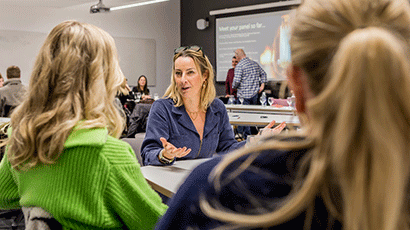
Wed 25 February 2026, 12:00
Science communication seminar
Online
Jon Chase presents Global scicomm: the global conversation around science.

Wed 25 February 2026, 18:00
An evening of Marketing and Psychology
Bristol Business School, X block, Frenchay Campus
Join us for an evening exploring how psychology shapes real-world marketing, featuring the launch of a new book plus insights from leading industry voices.
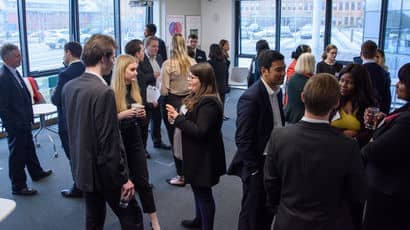
Tue 03 March 2026, 09:00
5th International Land Management Conference
Hybrid
The 5th International Land Management Conference is a collaboration between UWE Bristol and Land International Network for Knowledge (LINK).
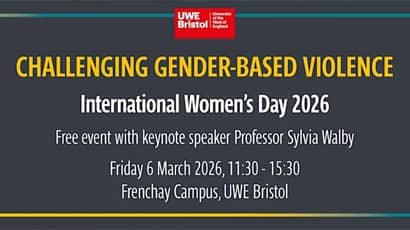
Fri 06 March 2026, 11:30
Challenging gender based violence
Enterprise 1, Frenchay Campus
Free International Women’s Day 2026 event at UWE Bristol with keynote speaker Professor Sylvia Walby – examining gender-based violence through research, policy debate and expert academic discussion.

Wed 18 March 2026, 18:00
What a waste: tackling food waste from production to post consumption
Sparks Bristol, 78 Broadmead
Join us to explore obstacles to, and opportunities for, reducing waste across the food system, from production to post-consumption.
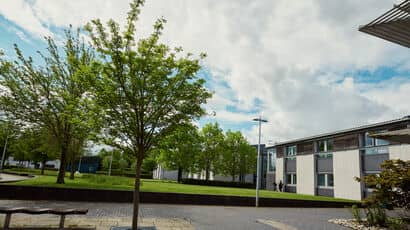
Wed 25 March 2026, 16:00
Climate Change Primary Education and Research Network
Online
Join the ECRG Sustainability in Education research strand's meeting featuring guest speakers, Dr Jennie Golding (UCL) and Cathy Wentworth (Head of Development, Green Schools Project).

Thu 16 April 2026, 09:30
Exploring bioregionalism
Bristol Business School, Frenchay Campus
How can place-based thinking help shape a fairer, greener economy? Join the Sustainable Economies Research Group (SERG) to explore bioregionalism.
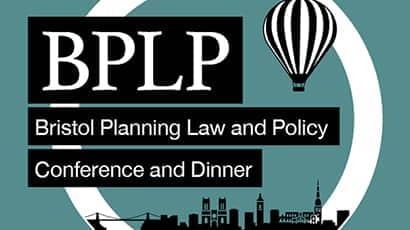
Thu 14 May 2026, 08:30
Bristol Planning Law and Policy Conference 2026
Ashton Gate Stadium, Ashton Road
The 25th Annual Bristol Planning Law and Policy Conference and Dinner.

Wed 20 May 2026, 16:00
Climate Change Primary Education and Research Network
Online
Join the ECRG Sustainability in Education research strand's meeting featuring guest speakers, Jane Spiteri (University of Malta) and Lucy Hawthorne (Climate Play).

Tue 09 June 2026, 09:00
Appearance Matters Conference
City Hall, College Green
The 11th Appearance Matters Conference

Wed 10 June 2026, 09:00
Appearance Matters Conference
City Hall, College Green
The 11th Appearance Matters Conference

Thu 11 June 2026, 09:00
Appearance Matters Conference
City Hall, College Green
The 11th Appearance Matters Conference






